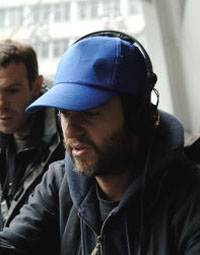 An Interview with Juan Carlos Fresnadillo, director of “28 Weeks Later”
An Interview with Juan Carlos Fresnadillo, director of “28 Weeks Later”
BY KEVIN CARR
On May 11, Fox Atomic will be releasing “28 Weeks Later,” the follow-up to Danny Boyle’s 2003 thriller “28 Days Later.” Boyle hand-picked Spanish director Juan Carlos Fresnadillo to spearhead the new film, which tells the story of an attempt to repopulate London after it’s been devastated by the rage virus. Robert Carlyle stars as the father of a family trying to survive another outbreak.
Excepts from the interview follow. Hear the entire interview here…
KC: HOW DID YOU GET CHOSEN FOR THIS MOVIE?
JCF: Danny [Boyle] was the man who was looking for me two years and a half ago. He loved “Intacto,” my first feature movie. And then he thought that I could be the man to make this movie because I know he was wanting somebody who could be introduced to the concept with fresh eyes. I accepted the project because it was very important to me to make my own movie, my personal point of view of this. And it was so helpful to hear from Danny to forget about the first movie and to make your own movie. In those terms of freedom, it was something really, really interesting to me.
KC: HOW DID YOU ADD TO THE STORY OF “28 DAYS LATER”?
JCF: When I watched the first one, I was completely surprised and amazed because the work that Danny made is such a real thing and such a powerful image. My contribution and my point of view of this one is to introduce the concept of a family to this story. This family in trouble, they are going to suffer the journey the movie is running. The point of view of the family to me is the heart of the story. The virus – the infection – takes advantage of this weak family. The darkness, the evil takes advantage of your weakness.
KC: SINCE THIS IS A EURO-CENTRIC STORY, HOW DID YOU APPROACH THIS TO DIFFERENTIATE IT FROM A STANDARD AMERICAN HORROR MOVIE?
JCF: When I thought of this genre movie, my position was always to create something real. And if you do that and you follow your gut feeling, at the end of the day, you’ve got an impressive result. More than dealing with the genre, I tried to do it in my way. I play with myself as a kind of journalist in this world, and that’s the way I really enjoyed it. You can make something really, really full of action and entertain, and you can drop a real movie. In this case, the scenario brings this kind of reality which is something I really love.
KC: DO YOU CONSIDER THIS A ZOMBIE FILM?
JCF: I think it’s something different because “zombie” means a kind of fantasy, and on the other hand, “zombie” is related to death. And infection and the disease of the movie’s showing up is related with life more than death. The symptoms of the disease – this kind of anger and rage of the people – they are took over by this. And then they act in this kind of crazy way. I think is a human feeling, but a human feeling means they are alive, that they are so real. This movie is talking more about life than about death.
KC: DO YOU CONSIDER YOURSELF AN OPTIMIST OR A PESSIMIST?
JCF: That’s a good question. I think a dark ending does not mean a pessimistic view about the reality. I think sometimes the dark is a good element to think about your world and the world that you live in. I think it’s a good punch in your face to wake up and to think of the world that we live in. I love these kind of apocalyptic visions when the rules of the world is not paying attention to the structure of the typical stories. In the realities, you can’t find mercy. It’s a way to create a real apocalypse. It’s not a pessimistic view. It’s a real view. But sometimes reality is full of dark.
KC: CAN WE LOOK FORWARD TO A “28 MONTHS LATER”?
JCF: I don’t know. When I made the ending, I didn’t try to create a kind of bridge for the next one. For me, it’s the ending that’s most justified by the story.
Podcast: Play in new window | Download
